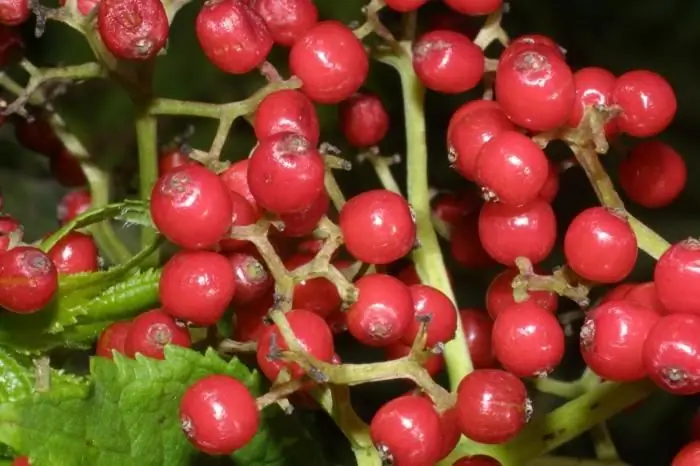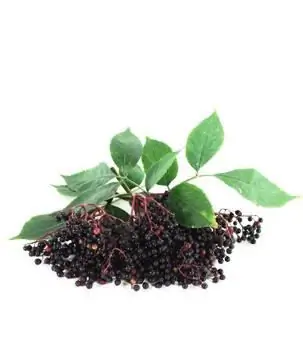- Author Curtis Blomfield blomfield@medicinehelpful.com.
- Public 2023-12-16 20:44.
- Last modified 2025-01-23 17:01.
Still Hippocrates recommended treating edema with a decoction of black elderberry roots. In the Middle Ages, this tree was considered not only healing, but also sacred, they believed that its fruits significantly prolong life. For medicinal purposes, flowers, bark and berries of the plant are used. They contain amino acids, vitamins, tannins and mucous substances, essential oil, vitamins E, C, salibutsin, carotene, rutin, choline, sambunigrin. This allows you to use it primarily for respiratory diseases, as a diaphoretic for colds, as a diuretic. Red elderberry has beneficial properties similar to those described above, but its range of effects is narrower, and the berries have an unpleasant taste. They are not used in cooking. Black elderberry is found everywhere. More often it grows among shrubs, in abandoned cutting areas. Does well in rich, fresh soils.

Black elderberry. Useful properties for external use
For burns, boils, wounds, lotions or wet dressings from a decoction of shrub flowers are used. From infusions of elderberry leavesit is recommended to do baths for hemorrhoids. The treatment of neuralgia, myositis and joint pain is quite effective with its flowers in the form of poultices. People use elderberry bark to treat face. To do this, the gray top coating is scraped off from two-year-old shoots, the bark is removed to wood, scalded with boiling water and applied several times (until inflammation decreases) to the affected areas.

Elderberry. Useful properties in diseases of the kidneys and liver
Shrub flowers are used as a diuretic and anti-inflammatory agent for acute and chronic cystitis. They also help with disorders in the liver. For internal use, an infusion of flowers is prepared as follows. Place 5 g of raw materials in a bowl preheated in a water bath, pour a glass of water and continue to simmer for a quarter of an hour. Strained infusion is brought with boiled water to the original volume. You can store it only 48 hours, no more. You need to drink, warming up, a quarter cup shortly before meals. Among the people, elderberry was also used to treat kidneys, edema, and diabetes. Useful properties in this case were attributed to the bark of the shrub. Young spring elderberry leaves were infused with honey or added to a decoction (a spoonful to a glass of liquid) and taken as a painkiller and laxative for chronic constipation.

Elderberry. Useful properties for colds, coughs, sore throats
With wheezing in the chest, the absence of sputum, you can take steam from the flowers of the bush. Needpour 20 g of raw materials with a liter of boiling water. It is necessary to drink 3 glasses of infusion a day. In this case, you can not violate bed rest. The same remedy can also be used as a blood cleanser. To gargle with sore throat, you need to boil a spoonful of elderberry flowers in 0.5 liters of water on low heat for 10 minutes. Infuse and strain the broth, warm slightly before use.
Elderberry. Useful properties in cooking
Shrub fruits are an excellent means of prevention against various diseases. However, they are not eaten raw. Berries can be dried, and in winter bake pies with them, cook dumplings, give to weakened patients. Also, black elderberries are used to make jam, jam, marmalade, jam, jelly. Canned compote or berry juice can then be added to various drinks.






